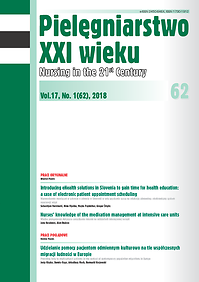Providing help to multicultural patients in the context of contemporary population migrations in Europe
DOI:
https://doi.org/10.2478/pielxxiw-2018-0005Keywords:
health personnel, cultural competence, cultural diversity, Human MigrationAbstract
PROVIDING HELP TO MULTICULTURAL PATIENTS IN THE CONTEXT OF CONTEMPORARY POPULATION MIGRATIONS IN EUROPE
Introduction. The population migration to the countries of the European Union (EU) of the conflict of war has grown substantially in recent years. According to the Office for Foreigners in Poland are staying 586 thousand foreigners. 279 refugees from Syria arrived in Poland in 2015. The economic development of Poland means that the number of foreigners settling in or crossing Poland and using the services of the Polish health service is constantly growing. Foreigners from outside Europe (the largest groups are Vietnamese – 8.8 thousand and Chinese – 6.2 thousand) were brought up in a different culture, but also people from European countries (the largest group are immigrants from Ukraine – 513 thousand) may differ from Poles perceive health and illness. Health Personnel may encounter difficulties in providing medical assistance and taking care of a culturally different patient. They may result from the language barrier, lack of knowledge about the differences in patients’ expectations or lack of skills in communication with the patient. The result may be improper assistance, violation of patients’ rights and avoiding the use of medical services.
Aim. Presentation of the migration of population in EU countries, analysis of problems arising during the provision of assistance to culturally different patients and an indication of the possibility of developing cultural competences of paramedics, nurses and doctors through education in this area.
References
1. Zespół do Spraw Migracji. Polityka migracyjna Polski – stan obecny i postulowane działania. Warszawa: Ministerstwo Spraw Wewnętrznych. Departament Polityki Migracyjnej; 2012.
2. Badowska M. Polityka społeczna a edukacja międzykulturowa. Pogran Stud Społeczne. 2011;17(2): 214-228.
3. Ministerstwo Spraw Wewnętrznych i Administracji. Proces przyjmowania uchodźców– fakty i mity [Internet]. [cytowane 17 wrzesień 2017]. Dostępne na: https://www. mswia.gov.pl/pl/aktualnosci/13724,Proces-przyjmowania-uchodzcow-fakty-i-mity.html?search=9966
4. Lima P, Bernabe S. Migration and the EU, Challenges, opportunities, the role of EIB. European Investment Bank; 2016, s. 14-19.
5. Fihel A, Kaczmarczyk P, Stefańska R. Recent Trends in International Migration in Poland. Cent East Eur Migr Rev. 2012;1(1):69-90.
6. EESC fact-finding missions on the situation of refugees, as seen by civil society organisations. Mission Report – Poland. European Economic and Social Committee; 2016 s. 1-7.
7. Główny Urząd Statystyczny. Narodowy Spis Powszechny Ludności i Mieszkań 2011. Warszawa: Zakład Wydawnictw Statystycznych; 2015, s. 93-108.
8. Jabłecka B. Migranci i zdrowie – wyzwania wielokulturowości w praktyce medycznej w Polsce. Instytut Spraw Publicznych; 2012, s. 1-5.
9. Jabłecka B. Strukturalne i kulturowe bariery w dostępie imigrantów do ochrony zdrowia. Warszawa: Instytut Spraw Publicznych; 2012, s. 1-31.
10. Hyder A, Morrow R. Culture, Behavior, and Health. W: International public health : diseases, programs, systems, and policies Merson MH, Black RE, Mills AJ. 2nd ed. Sudbury: Jones and Bartlett; 2006, s. 41-66.
11. Uskul A. Socio-cultural aspects of health and illness. W: French D, Kaptein A, Vedhara K, and Weinman J, (Eds) Health psychology. 2nd ed. Oxford: Wiley-Blackwell; 2010.
12. Mroczkowska R. Odmienność kulturowa jako nowe wyzwanie w praktyce pielęgniarki i położnej. Pielęgniarstwo Spec. 2013;1(1(1)):27-31.
13. HealthCare Chaplaincy. A Dictionary of Patients’ Spiritual & Cultural Values for Health Care Professionals; 2011, s. 7-69.
14. Collantes S. Czy osoby ubiegające się o nadanie statusu uchodźcy oraz nieudokumentowani migranci mają dostęp do opieki medycznej w krajach Unii Europejskiej? Porównanie sytuacji w 16 krajach. W: Poza systemem Dostęp do ochrony zdrowia nieudokumentowanych migrantów i cudzoziemców ubiegających się o ochronę międzynarodową w Polsce. Warszawa: Stowarzyszenie Interwencji Prawnej; 2011, s. 113-142.
15. Klorek N. Ochrona zdrowia nieudokumentowanych migrantów i osób ubiegających się o ochronę międzynarodową w opinii cudzoziemców. W: Poza systemem Dostęp do ochrony zdrowia nieudokumentowanych migrantów i cudzoziemców ubiegających się o ochronę międzynarodową w Polsce. Warszawa: Stowarzyszenie Interwencji Prawnej; 2011, s. 45-112.
16. Van Damme-Ostapowicz K. Dialog wielokulturowy. W: Problemy wielokulturowości w medycynie. Warszawa; 2010, s. 103-7.
17. Padela AI, Punekar IRA. Emergency Medical Practice: Advancing Cultural Competence and Reducing Health Care Disparities. Acad Emerg Med. 2009;16(1):69-75.
18. Chauvin P, Parizot I, Simonnot N. Access to healthcare for Undocumented Migrants in 11 EU countries. Médecins du Monde European Observatory on Access to Healthcare; 2009.
19. Horvat L, Horey D, Romios P, Kis-Rigo J. Cultural competence education for health professionals [Internet]. Cochrane Database of Systematic Reviews; 2014 [cytowane 25 grudzień 2017]. Dostępne na: http://onlinelibrary.wiley.com/ doi/10.1002/14651858.CD009405.pub2/abstract
20. Langdon EJ, Wiik FB. Anthropology, health and illness: an introduction to the concept of culture applied to the health sciences. Rev Lat Am Enfermagem. 2010;18(3):459-466.
21. Carrillo JE, Green A, Betancourt J. Cross-Cultural Primary Care: A Patient-Based Approach. Ann Intern Med. 1999;130(10):829-834
Published
Issue
Section
License
Copyright (c) 2018 Authors

This work is licensed under a Creative Commons Attribution-NonCommercial-NoDerivatives 3.0 Unported License.




